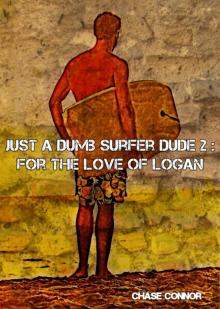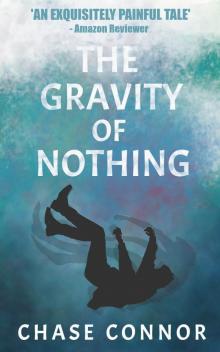- Home
- Chase Connor
Between Enzo and the Universe Page 5
Between Enzo and the Universe Read online
Page 5
I would wake up each morning with “I’m sorry, God” as my first thought.
All because I had done nothing.
Besides learning that I was gay and that masturbation was a guilt-laden, though wonderful activity one could carry out behind a locked bathroom door or in the dead of night when everyone else slept, two other major events happened in my thirteenth year of life. Our family of five became six when Noe and I became brothers to my sister. And then we emigrated from France.
Unlike Noe, Ila had been born in France, but like Noe, she had been unwanted by her parents and numerous families thereafter. This I learned at the same time I found out about Noe being unwanted and how some parents do not want their children if they are different. Though he could not express himself in a way that made it perfectly clear, I knew that Noe was excited that we were getting a sister when I talked to him about Ila’s imminent arrival. Though I knew that Ila would be different, just as Noe had been, I was still thrilled with the knowledge that she would arrive.
Just like when I first met Noe, I didn’t care that Ila was different—in almost the complete opposite way as Noe—I was just overjoyed at having a sister. Having both a brother and a sister was one of my prayers answered. Upon meeting her in our sitting room, another stern woman delivering her to us just as had been done with Noe, I saw that her facial features were quite different than those of everyone else in the family. When she spoke excitedly and happily, she spoke too loudly. She had a habit of laughing loudly at things that were really not all that funny, and she had trouble deciding when it was appropriate to speak and when to let others speak instead. Those things were what I loved best about her. When it was made clear to her that our parents were now also her parents, she was overjoyed. When she was informed that Noe and I were now her brothers, I thought she would fall over from excitement. She was older than Noe but seemed to need more guidance and care than either of us boys ever did.
Ila gave the best hugs I had gotten before or since, though I had to explain that she should never hug Noe. Mom and Dad dealt with the stern lady in another oversized suit while I took Ila to play and explained to her about not touching Noe or being too loud around him if she could help it. I told Ila that one day, he might allow her to hold his arm or be closer to him, but in the meantime, she should try to imagine a bubble around him and that getting too close would pop that bubble. Ila was such an excitable person that I was concerned that no matter how many times she was told that she would still disrupt Noe’s happy environment. To my surprise, Ila was nearly as reverent as the neighbor’s dog had been in regards to not touching Noe. Volume control, however, was another matter. But since Ila was respectful of Noe’s personal space, he somehow adapted to her squeals and happy yelling. He would wince, but he tolerated the extra noise that came with Ila.
Church became a reason that I was glad to emigrate from France because Ila and church gave me another reason to hold Catholic guilt.
She is distracting for everyone else.
Some church members—not all, mind you, but some—are disturbed by her.
Maybe she can stay at home while the rest of the family comes to church, yes?
Mom and Dad would bring us all to church, just as they always had, but Ila found it difficult to sit through such long events without making noise or moving around a lot. She liked to try to talk to other people, especially to kids her age and other children, during church.
The looking down of noses, disgust on the faces of other members of our church, the whispers and stares. Sometimes outright animosity and displays of impatience by other Catholics at having to deal with a child who was different. Every Sunday, halfway through service, Mom would ask me in a hushed but unembarrassed tone to take Ila outside, down the street, to play so that everyone could continue through service without being disrupted. As I led Ila down the aisle, my larger hand holding her smaller hand, her cute little stubby fingers doing their best to clutch my hand, people would stare. Or roll their eyes. Shake their heads. Somehow managing to make disgusted faces at my sister, whom I thought was one of the most beautiful people I had ever met.
Ila and I would play tag and race a block away from church or see who could find the prettiest rock or spot the prettiest bird. Sometimes we would lie in the grass, and she would tell me about her new favorite animals—which was always giraffes—and I would tell her the story about her becoming part of her family. It was her favorite story besides the story of how Noe came to be my brother. As I told her these stories, I felt my most tremendous guilt as a Catholic. Not because I had done anything wrong.
But because I knew, without a doubt, that aside from my family, I hated everyone in that church. And I wouldn’t feel guilty about that.
So, I felt guilty for not feeling guilty.
That is the cross that Catholics, and a brother with a sister who is different, just have to bear.
An Unaffordable Coat
Barely twenty minutes went by before Peter seemed to tire of my overly optimistic view that we would find another vendor who was selling a coat. Though the city is large—as cities tend to be—the festival itself could be explored in its entirety within that time. We had walked, mostly in friendly, though not entirely comfortable silence, through every street and alleyway where vendors had set up their wares. We had passed several food carts and tents, stalls lined with sweaters and t-shirts with big, bold words in French and sometimes English, booths filled with cheap plastic toys that made lots of noise and flashed lights, informational booths set up with literature about the city and province, and even palm and Tarot card readers. I was not the type of Catholic who felt that things like palm reading and Tarot cards were evil—my family had never been that silly, holding onto superstitious beliefs that crazed priests espoused as tools of Satan—but I felt paying money to know my fortune was a waste. After the years that had passed since we had moved to Canada, I was certain more of the same was to come. And if not, why pay good money to ruin a good surprise?
Peter, I found, was a person who loved to walk briskly, which was fortunate since my long legs tend to propel me forward faster than most. He had no trouble keeping up as I hurriedly strolled through the streets, shooting into alleyways on a moment’s thought, or switched directions abruptly on a hunch. His breathing was controlled and healthy, the signs of a man who was not unfamiliar with exercise and efficiency of movement. My sweater sleeves became gloves as we walked, and I tucked my hands inside of them, desperate to make my fingers not feel like icicles. A few times, I saw Peter glance at my hands stuffed up in my sleeves, though he was kind enough not to ask questions or make comments. Nothing was said about why I had no gloves or an adequate coat for the weather, and he didn’t ask why I looked as though I was dressed like a lead singer in a 90s American Grunge band. I was thankful for that because the answers to those questions involved giving away information that I not only wanted to keep to myself but would have humiliated me beyond the point of mending if I provided those answers.
Still, I forced myself to keep walking and searching, though I knew that everything I was doing was in vain. The red coat in the tent next to the donut vendor had been my one chance. Intervening on a stranger’s behalf, simply so he would not lose a measly few dollars, had cost me my opportunity to be warmer throughout winter at a price I could actually afford. A few measly dollars. Dollars were like gold coins to me, so how could I arbitrarily decide that this was not an important amount of money for my coat search party companion? With his exceptional coat and scarf, his expertly style hair and manicured hands, his expensive cologne, it would be easy to simply decide that he was a man with money to burn. However, maybe the five dollars he had spent getting donuts to share with me had been more money than he could have spared from his budget. He had mentioned wanting to find some “real food,” but that did not mean that he had a lot of money. Dinner might include plans to pay with a credit card and then pay for it all later.
“What brings you to Québec?”
Peter asked suddenly as I led us down a street that I immediately recognized as one we had walked down twice previously. “From France, I mean. Did you move here for college?”
“Non,” I said. “We came here when I was in secondary school. Grade eight. I have finished college.”
“You look so young.”
“I am in my first year of university.”
My heart skipped a beat as I thought of my studies and how time, money, school supplies, and responsibilities were making university nearly impossible to attend.
“Okay.” He responded with a chuckle as he followed me. “It’s obvious that I don’t know anything about how school works here.”
Finally, I stopped, right before we exited the street onto another. I turned to Peter, wanting to be cross with him for asking such questions when we had more pressing matters. My companion was looking up at me, a smile outlining the curiosity affixed to his face. Instead of being irritated, I slid my hands out of my sleeves so that I could shove them into my pockets and did my best to smile at Peter.
“I do not know anything about American schools, or I would draw parallels for you.”
“What are you studying?” He offered as an alternative.
“Communications.”
“How do you say that in French?”
“Communications. Or, les communications, I suppose.”
“Huh.” The corner of his mouth turned up. “You just have to give some things a French accent. I thought that was a myth.”
I couldn’t help but smile at that observation, though I found myself unsure of what else I could say to him. His red, wavy hair was distracting, and his upturned lip was enticing. I wanted his cologne to disappear like the smell of Noe’s coat. That thought made my throat constrict.
“You’re not going to find a coat at this festival.” He said.
“Non,” I relented, refusing to be angry that he said the horrible thought in my head out loud. “I will not. I will go to a store tomorrow.”
Thrift store.
But I refused to be specific with Peter.
I would have to make sure that I did not eat anything else until I had found and purchased an affordable and durable coat the following day. Then I would feast if the budget allowed it. I would eat until I was sick and warm in my new coat. If I had close to half of my money left over, I would go to the dumpling restaurant underneath Mr. Paquette’s ESL classroom, and I would eat until I ran out of money. Then I would sit in my seat and rub my belly and drink warm herbal tea and revel in the warmth of my new coat and the calories I had ingested. The thought made saliva pool at the back of my mouth once more.
“It’s not that late.” Peter lifted his arm to glance at the expensive watch around his wrist that I had not noticed before. The fact that he was wearing a watch amused me. Who wore a watch in the age of mobile phones? “I’m sure we can find a store that’s open.”
“I will go tomorrow.” I managed to not sound too stern.
Peter shrugged.
“Then, I guess you have to show me where I can get a decent dinner.” He said. “You promised to show me where a café was if I walked all over the festival with you.”
I looked down, an embarrassed smile blooming on my face. Peter had been patient in following me all over the city center in search of something that did not exist. He hadn’t even questioned me to find out if I possibly had a mental disorder or was under some kind of distress. He had trusted that I was a safe and friendly guy who just happened to appear as though he might also be homeless. Names of restaurants spilled through my head as I tried to decide where I would lead my companion for his dinner. It dawned on me that I had no idea what sort of food Peter might be interested in or whether or not he had a specific budget for his meal.
“What do you like to eat?”
“I’ll eat just about anything.” His hands went to his coat pockets. “But something that will stick to my ribs and make me sorry tomorrow will be best. I mean, I’m traveling, so I shouldn’t eat responsibly, should I?”
I smiled at that. People who enjoyed food were my favorite people. Americans with open minds about food were even better. If they happened to be handsome Americans with beautiful red hair, it is even better.
“Is there,” I began, unsure of how to politely ask an American about money, “do you want to spend a specific amount of money?”
Peter grinned wickedly. “I want to be sorry about that, too. But only if it’s worth it.”
I nodded, my smile growing wider.
Instead of directly answering, I began to move, indicating that Peter should follow me. He fell in beside me, his steps matching mine, keeping up with my pace, though I settled into a leisurely stroll since it was obvious I was no longer on a mission to find a coat. As we walked, I found my hands sliding up into my sleeves once more as I pulled my sweater tightly around myself. The city had not grown unusually cold for the time of year, but the lack of body fat I had then made any gust of cold wind feel like icy daggers against my flesh. Peter’s frequent glances at me, huddling in my sweater, were hard to ignore, so I decided that conversation was the best way to distract him from wondering about my clothing predicament.
“You are traveling?” I asked.
“Yeah.” He said, his eyes lighting up at my initiating conversation. “I’m obviously not from here.”
I chuckled. “Why have you chosen Québec?”
“Well,” he answered with an easiness I hoped to one day possess, “I’m actually here for work, so just saying that I’m ‘traveling’ might not be completely accurate.”
“Oh?” I flexed my toes as we walked, hoping they would warm. “What is your job?”
Peter seemed amused by this question.
“Am I being rude?”
“No.” He waved me off with a smile. “I’m a Financial Examiner. I dabble in forensic accounting from time to time. It’s exciting to me, but a lot of people find it boring as hell. So, I don’t talk about it much.”
I raised my hands to the side of my head and pulled them outward, as though an explosion went off in my brain, as we walked along. Peter laughed as I slid my hands back into my pockets.
“I work for the U.S. government.” He continued. “I check in on companies’ financial records and make sure they aren’t doing anything illegal…I’m like the money police. I also do some contract work.”
“Money police?” I grinned widely. “That sounds much more exciting. You should tell people that is your job instead.”
“Ya’ know what?” He turned his head to grin at me. “I think I will. I mean, people will have questions, but at least I’ll sound cooler.”
“Very cool.” I laughed.
We walked a few moments longer before Peter asked the inevitable question.
“Do you work as well?” He tried to sound nonchalant. “Or are you staying with your parents while you finish school?”
“It is just me,” I said, simply.
“No parents?”
“Non.”
“Are they back in France?”
I ignored the question. “I was working as custodian at a big…ah…department…store. But now I am cleaning for many different people.”
How did I struggle with that word of all words?
“Why did you leave the department store?”
“I had difficulty getting to work on time,” I said though I didn’t really want to answer. He had been so open with information about his job that I hated to not give him some information about me, no matter how small. “I was taking care of my brother then.”
“Oh,” Peter responded. “Where’s your brother now?”
I stopped, an exasperated sigh escaping my mouth against my will. Peter’s movements stopped as well, and he turned to look at me, concern that he had offended me in some way etching his face as he looked up at me.
“It is just me now,” I said, simply.
For a moment, we were staring at each other, and then his eyes grew sad.
I nodded.
“I’m sorry if I was rude.”
“You are not rude.” I shook my head and began walking again, though slower this time.
“Okay.” He replied. “Even so, I’m sorry that it’s just you now, Enzo.”
“Thank you,” I said. “I am, too.”
We walked along the street, motorists and bicyclists passing sporadically, the sounds of the festival in the increasing distance, not speaking for several moments. It took me a moment to remember that we were walking, not to have a conversation and learn about each other, but for me to show him where a good restaurant was in which to have dinner. When Peter had first said that he wanted a hearty meal, something to “stick to his ribs” and make him “feel sorry” the following day, only one restaurant came to mind. When my family had first come to Québec from France, we still had money to spare, so after church each Sunday, we had a late lunch at a restaurant called Le Canard Paresseux – The Lazy Duck. It was a funny, whimsical name for such a nice restaurant, especially one that never seemed to have duck on the menu. However, they were known for exceptional, yet humble dishes, course after course being brought to the table until you were begging them to show you mercy. While not overly sophisticated, it was better than a café, and it was not as expensive as one of the many restaurants in the city that served tiny bites of food on larger plates than necessary while insisting that the diners should be grateful.

 For the Love of Logan
For the Love of Logan A Surplus of Light
A Surplus of Light Jacob Michaels Is Tired (A Point Worth LGBTQ Paranormal Romance Book 1)
Jacob Michaels Is Tired (A Point Worth LGBTQ Paranormal Romance Book 1) Between Enzo and the Universe
Between Enzo and the Universe Jacob Michaels Is Not Jacob Michaels (A Point Worth LGBTQ Paranormal Romance Book 3)
Jacob Michaels Is Not Jacob Michaels (A Point Worth LGBTQ Paranormal Romance Book 3) Jacob Michaels Is... The Omnibus Edition: A Point Worth LGBTQ Paranormal Romance Books 1 - 6
Jacob Michaels Is... The Omnibus Edition: A Point Worth LGBTQ Paranormal Romance Books 1 - 6 Jacob Michaels Is Not Crazy
Jacob Michaels Is Not Crazy Summer Hearts
Summer Hearts Jacob Michaels Is Trouble (A Point Worth LGBTQ Paranormal Romance Book 5)
Jacob Michaels Is Trouble (A Point Worth LGBTQ Paranormal Romance Book 5) Just a Dumb Surfer Dude
Just a Dumb Surfer Dude The Gravity of Nothing
The Gravity of Nothing